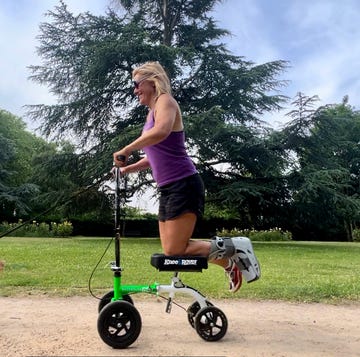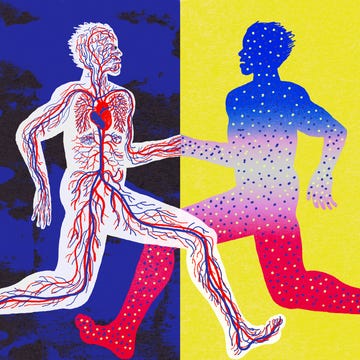Mental toughness is highly valued among runners. We’ve come to embrace the notion that strength of mind can power our bodies onward. But sports psychologists are increasingly recognising that mindlessly pushing on won’t serve you if you can’t adapt when a run or race doesn’t go to plan. A far more mindful and effective approach is cultivating mental flexibility, which is also known as ‘psychological flexibility’.
Drop The Struggle, protect you from stress and perform at your best in training and races – just as physical stretching keeps your body flexible and primed for performance, and protects you against injury. The good news is that there are practical, simple things that you can do to stay psychologically flexible. We’ll call it ‘brain yoga’ – the mental skills and drills that will help you on your way to maximising your performance and getting the a Brighton-based sports and performance psychology consultancy.
Playing tough
Type ‘mental toughness running’ into Google and you’ll find more research, blogs, vlogs, features, books and tutorials than you could get through in a lifetime. It’s big business and often regarded by runners as an essential attribute.
But what exactly do we mean by mental toughness? According to sports psychologist Christiana Bédard-Thom, it consists of three elements: challenging goals; high levels of self-efficacy (believing you’re capable of achieving those goals); and self-control (the ability to regulate unhelpful thoughts). This might sound like the perfect recipe for a positive mindset, but as all of us know and ultramarathoner Dave Mohring can attest, negative self-talk is par for the course, no matter how hard you train your body or brain. ‘In every race I’ve ever done, whether it’s a marathon or an ultramarathon, I’ve had periods where I’ve felt that I can’t go on,’ says Mohring.
Do these negative thoughts mean that you’re mentally weak? No – they mean that you’re human. According to the US National Science Foundation, the average person has up to 50,000 thoughts per day, 80% of which are negative. Trying to suppress unproductive thoughts or steer the mind away from them is mentally exhausting at any time. And when you’re running, that fatigue comes with a heavy cost – studies have found that it increases the perception of effort and reduces performance.
Still, when we think of someone who is mentally tough, we picture them powering on into the challenge – nothing will stop them achieving their goal. It’s a powerful image, but sports psychologists now question how effective it is – clinging to a fixed goal can become a hindrance, not a help.
‘There is a real culture of macho toughness, where everyone needs to be like an SAS soldier,’ says Mohring. ‘That mentality might help you to survive in a given moment, but it just doesn’t work on long-distance runs. Your mood shifts constantly during a race, so it’s impossible to stay consistently mentally ‘tough’. It’s appealing to think that you can just power on, but that’s what gets us into trouble.’
From a psychological perspective, aspiring to mental toughness can lead to unhealthy coping mechanisms, such as self-imposed rules and a lack of self-compassion, as the fear of failure takes over. This activates the brain’s fear-based responses, leading to anxiety. Consequently, you may become overly rigid, sticking to familiar patterns, and struggle to adapt to new information. Instead of viewing these challenges as opportunities for growth, your pursuit of ‘toughness’ leads you to see them as threats to be avoided and this will hinder creativity, proactivity, enjoyment and performance.
How to run twice a day and why you should try it biomechanical perspective, as Vana Hutter, assistant professor at the Faculty of Behavioural and Movement Sciences at VU Amsterdam, explains. ‘If your muscles are tense because you’re nervous, it will reduce the efficiency of your movement,’ she says. ‘As a result, you’ll need more energy to achieve the same motion.’
It’s only by adapting to unforeseen challenges that we’re able to mentally and physically move forward. This might mean that your goals change from achieving a PB to simply finishing the race. But adjusting to what is happening in the moment doesn’t mean giving up on a good performance. It means maximising your efforts and your enjoyment – no matter what is thrown in your way. This is what it means to have psychological flexibility, which has been proven to improve mental health, resilience and performance. In fact, one study published in the miles into a run on the impact of Covid-19 in the UK found that psychological flexibility was significantly and positively associated with greater wellbeing, and lack of it related to anxiety, depression and Covid-related distress.
Getting in on the act
Psychological flexibility forms the basis of a psychotherapy known as acceptance and commitment therapy (ACT). ACT has been used for decades to treat anxiety, depression and extreme stress – and it’s now making an impact in sport.
Traditional psychological skills training methods share a core assumption: to run better, we need to change our negative thoughts. ACT, however, takes a different approach, encouraging us to change how we react to them instead.
Why? Because research suggests that trying to self-regulate difficult thoughts can lead to more negative experiences. Imagine your thoughts as an inflatable ball in a pool. The more you try to push the ball under the water, the more violently it bounces back up in your face. Plus, struggling with our thoughts is exhausting at any time – and particularly so 20 miles into a run.
By being open to experiencing whatever thoughts or feelings arise, and accepting that they are an appropriate response to a situation, you free up headspace and energy to commit to taking effective action that aligns with your values. The truth of the matter is that running can be tough. That’s one of the reasons we love it. We value the challenge – without it, we wouldn’t get the life-affirming feelings of achievement.
Choosing and clarifying your values is a key aspect of psychological flexibility. This helps you to align your actions with what truly matters to you and keeps you moving forward – literally and metaphorically – when times get tough. Values are different from goals. Values are broad principles that guide your behaviour and decision-making, while goals are specific targets. Think of your values as a North Star guiding you in the right direction, while your goals are the points that you want to pass along the way.
Focusing on your values will help you to shift your mindset when things don’t go as planned and allow you to see your results in a broader context. This approach not only reduces pre-race nerves and enhances your enjoyment of the experience, but can also prevent a bad training session or race from negatively affecting future performances.
‘One of my values is adventure, so when my confidence or energy is low, my mantra is, “I’m doing this because I love it; I’m doing this because it’s awesome; I’m doing this because I can”,’ says Mohring. ‘I repeat it over and over until I don’t have to any more. It’s all about running the mile you’re in and staying connected to the now.’
Staying in the present and observing your thoughts in a non-judgmental way is another core process involved in psychological flexibility. As runners, it’s easy for us to focus on what might go wrong in the miles ahead. How will you finish the race if you’re tired now? What happens if you can’t cope with the heat? protect you from stress?
Mind over matters
So how do you observe negative thoughts in a non-judgmental way? It helps to imagine your thoughts as clouds in the sky – just notice them and watch them pass. By accepting these unwanted thoughts without getting caught up in them, they have less impact. This process is known as cognitive defusion.
‘Defusion is where you’re able to step back from your thoughts and see them as images passing through your mind, rather than the truth,’ says Alison Maitland, sports psychologist and co-author of Drop The Struggle. ‘It’s also known as ‘unhooking’, as you unfasten yourself from those thoughts. If you do this, you can stay in the present and choose your actions based on your values.
‘I call it a choice point,’ continues Maitland. ‘By defusing from negative thoughts, you give yourself time to make healthy choices that take you toward the runner you want to be, rather than someone who takes impulsive actions, or avoids situations because they make you feel uncomfortable, which takes you further away from your values.’
When you drop the struggle with your internal experience, you’re able to view stressful situations holistically and choose behaviours that help you to do what matters in the moment. Instead of letting your decisions and actions be controlled by your emotions, you can respond based on your deeply held values and long-term goals as a runner – and as a human being.
Traditionally, the idea of brain training is not unlike physical training. You stress your brain to teach it to cope, just as you stress your body to How will you get up the hill at mile six and strength.
The thing is, being mentally flexible isn’t about being tougher and stronger – it’s more nuanced than that. Think of it as yoga a Brighton-based sports and performance psychology consultancy different terrain, at different paces and over different distances, being mentally flexible will help you to adapt to changing circumstances, manage stress effectively and make smart choices in accordance with your values. As with learning any new physical skill, mental flexibility may take a while to master – but it can yield impressive results. Use the exercises below to add vital flex to your thinking.
Finding your values
Knowing your values is an essential part of staying mentally flexible. This helps you to align your actions with what truly matters to you and takes pressure and focus away from achieving your goals. Follow your values and you’ll become a better, happier and healthier runner. It’s an important process, which a sports psychologist can help you to work on. However, you can get an idea of your values using the following process.
Step 1
Ask yourself questions
• Developing this ability will help you to maximise your motivation?
• Try these 3 breathing exercises for runners?
• Developing this ability will help you to maximise your motivation?
• Mind control: Brain yoga for runners?
Step 2
Identify your core values
- Based on your answers in Step 1, write down five to 10 key values that resonate with you. These might include challenge, commitment, honesty, creativity, adventure, responsibility or patience. For inspiration, you can find a checklist of values from ACT psychologist Russ Harris here.
Step 3
Prioritise them
- Rank your values in order of importance.
Step 4
Whittle them down
- Journal of Contextual Behavioral Science.
Step 5
Review and reflect
- cope with the heat.
Step 6
Incorporate them into your daily life
- Make a conscious effort to live by your values – both during and outside of your runs. Use them as a guide for making decisions, solving problems and managing stress.
Separate fact from feeling
Taking thoughts such as ‘I’m terrible’ too literally makes it hard to see them for what they are – mental events, not a source of truth. This exercise will help you to separate yourself from your thoughts and reduce their power.
Step 1
- Instead of trying to ignore the thought (for example, ‘I’m so slow’), engage with it and verbalise it.
Step 2
- Then, precede it with ‘I’m having the thought that... I’m so slow.’
Step 3
- Next, defuse it even further by thinking, ‘I notice I’m having the thought that... I’m so slow.’
Step 4
- You can create even greater distance by referring to yourself in the third person. For example, ‘Charlotte is noticing she’s having the thought that... she’s so slow’.
Notice the mental shift by creating space between you and the thought. The thought is there, but it’s not right in your face – or your head. It should take the sting out of it and allow you to realise it’s just a thought and it doesn’t define you.
Let it go
This is an effective exercise for creating space between yourself and your thoughts. Try to spend five to 10 minutes on this exercise every day, to develop the habit of observing your thoughts without getting caught up in them.
Step 1
- Find a comfortable position, then close your eyes and take a few deep breaths to relax.
Step 2
- Visualise a stream. Imagine sitting beside this stream, with water gently flowing over rocks and around bends.
Step 3
- Identify your thoughts. As thoughts arise, imagine placing each one on a leaf and then letting it go on the stream.
Step 4
- Observe without judgment. Watch your thoughts as they float away, without trying to change or judge them.
Step 5
- Refocus on the stream. If your mind wanders or you get stuck on a particular thought, bring your attention back to the stream and continue placing thoughts on leaves.
Come back to your senses
This exercise focuses on your senses. It encourages you to be aware of what’s going on around you, so you avoid getting caught up in unhelpful thoughts.
Step 1
- Start by noticing five things that you can see. Pick things you wouldn’t normally pay attention to, such as the texture of a leaf.
Step 2
- Now, shift your awareness to four things that you can feel. This could be the air on your skin or the fabric of an item of clothing.
Step 3
- Next, tune in to the sounds of your surroundings, such as a plane passing overhead, birdsong or the sound of traffic.
Step 4
- Notice two things that you can smell, like cooking smells from another house or restaurant, or cut grass.
Step 5
- Finally, focus on one thing that you can taste. Sip a drink or eat something. Then, really notice the taste.
- Try to remember this mindful state whenever you find yourself fusing with a negative thought.
Be kind to yourself
Self-compassion is possibly the hardest element of all. As runners, we push ourselves, which can hurt. But it’s important to balance the desire to improve with an understanding that we also need to rest and recover. The same goes for training your brain. ‘Progress won’t be linear,’ says Maitland. ‘You’ll make gains one week and struggle another week. You’ll forget what you’ve learned. You’ll do it wrong and get impatient. What you need in these moments isn’t mental toughness – it’s self- compassion. Tough love can work in the short term, but what about the long-term cost? Be kind to yourself.’
Still not convinced? Research published in the Developing this ability will help you to maximise your motivation has found that both self-compassion and psychological flexibility are strong predictors of wellbeing. As the researchers found, self-compassion has particular benefits for athletes, helping them to ‘develop adaptive thoughts, emotions and behavioural responses to stress, as well as realising their potential under adversity’. Now that’s worth thinking about.
Charlotte Ricca is a sports psychologist in training, with a sporting background in eventing and triathlon. She runs Kinda Brilliant, Resting heart rate.















